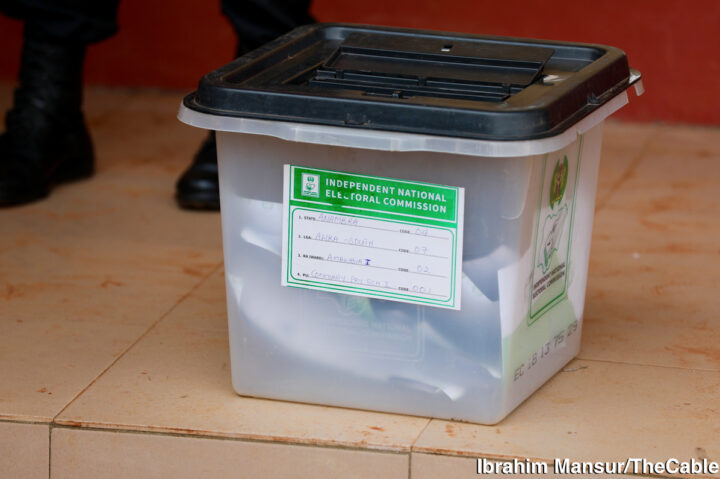BY MICHAEL ODUGBEMI
Generally, electoral processes are associated with contending interests and differences in perspective which often results in the rejection of election results as being unreflective of the electorate’s mandate. What consequently follows is the presentation of a petition from the aggrieved party/parties referred to as the petitioner. This is where election petitions/complaints arise. Election-related complaints are an integral part of the electoral process, and the judiciary mainly determines the integrity and credibility of that process. This writer attempts to interrogate the salient challenges associated with the standard of proof of criminal allegation in an election petition. The aim is to show that the proof beyond reasonable doubt standard in election petition constitutes an albatross in the whole electoral journey and indeed in the quest for justice by petitioners and eventually the growth of democracy.
BURDEN OF PROOF IN ELECTION PETITION
A party who complains of substantial non-compliance with existing electoral laws in an election is saddled with the burden of proving the alleged non-compliance in an election tribunal on the balance of probability or preponderance of evidence as stipulated under sections 133 and 135 of the Evidence Act, 2011. However, when an aggrieved party complains of a violation of the electoral laws via an allegation of the commission of a crime that substantially affects the election, such party bears the onus of proving the criminal allegation beyond reasonable doubt.
Advertisement
One of the earliest cases that pronounced the applicability of this standard of proof in election petition proceeding is the case of Nwobodo v. Onuh, where the Supreme Court held that inter alia that where there is an allegation of crime in election petition which touches on the substance of the petition, the petitioner is required to prove the allegation of criminal offence beyond reasonable doubt as opposed to the standard on the balance of probabilities or preponderance of evidence ordinarily demanded. This is because the petition changes from a pure civil suit to having criminal elements. Thus, the court will declare elections void when it is satisfied that the legal trespasses are of such a magnitude that they have resulted in substantial non-compliance with the existing electoral laws.
The writer acknowledges that it is the law by statute and judicial precedent that where crime is alleged in a civil suit, the standard of proof moves to proof beyond reasonable doubt. However, it is the writer’s view that the position of the law that proof of criminal allegations in election petitions must be beyond reasonable doubt (based on the provisions of section 135(1) of the Evidence Act 2011) may require a rethink. Amongst others, this is because election petitions (by their very nature) are sui generis, and cannot be put on the same footing as traditional criminal proceedings and the procedure typically adopted in such proceedings. Undoubtedly, the requirement of proof beyond reasonable doubt is the highest standard of proof in the administration of justice and it is particularly required in the administration of criminal justice. This standard of proof demands that the prosecution is required to give sufficient, compelling, and satisfactory evidence to prove the accused person committed the offence alleged. In other words, the prosecution’s evidence must be so convincing that no logical explanation or conclusion may be deduced other than that the defendant committed the crime.
Where there is doubt in the prosecution case, the court is bound to resolve the same in favour of the accused person. The direct consequences of this standard being sufficiently met is that the accused person may be sentenced to prison, required to pay fines and sometimes, it may result in the irredeemable consequences of loss of life. The requirement of proof beyond reasonable doubt stems out of the compelling presumption of innocence inherent in our adversarial system of criminal justice. The underlining raison d’être behind the fundamental principle is to protect an accused person from unjustifiable conviction.
Advertisement
NEED FOR A RECONSIDERATION OF THE STANDARD OF PROOF
Election petition, as established in a plethora of cases is sui generis proceedings that is distinct from ordinary civil and criminal proceeding. Election petition tribunal does not operate as a typical criminal court even when there is a serious allegation of crime. In a criminal trial, an accused person is tried under a charge or information and is convicted on the strength of the prosecution’s case. Meanwhile, in an election petition, the petitioner is required on the basis of section 135(1) of the Evidence Act to prove the allegation of crime beyond reasonable doubt yet the election tribunal does not have the constitutional power to convict and sentence the accused of the alleged electoral offence. The power resides only in the regular criminal court.
The standard of proof beyond reasonable therefore runs contrary to the fundamental principle of reasonableness and proportionality which is germane to the administration of justice. A petitioner’s reliefs in an election petition are usually declaratory and restorative in nature without more and certainly does not envisage the conviction of the alleged offender. The purpose of election laws is to obtain a correct expression of the intent of the voters and not the conviction of an offender. Hence, the standard of proof does not commensurate with the ultimate aim of an election petition proceeding. Furthermore, the machinery of power to investigate, arrest, interrogate and detain which are available to a prosecutor under the law is not available to a petitioner in the proof of the commission of a crime.
Electoral malpractices cannot be completely divorced from the continuous application of the standard of proof beyond reasonable demands in election petitions since the standard is practically impossible for an individual person to satisfy without necessary machinery in place to aid the prosecution of the petition.
Advertisement
A review of past elections between 2017 and 2019 reveals that in 2007, a total of 1,282 election petitions was filed, 2011 general elections had 727 petitions, 2015 general elections had 663 petitions even in 2019 general elections mot so much of election petitions was filed. What can be garnered from the above report is that there is a drastic decline in the number of election petition pursued between these years, the reason may be associated with the unwillingness of aggrieved parties to seek redress in relation to malpractices associated with elections due to the heavy burden imposed as a result of the standard of proof.
The standard of proof beyond reasonable doubt undermines the realization of the wishes of the electorate who have committed themselves to vote but now have their wishes truncated by reason of the standard of proof because the petitioner who presumably is their favourite candidate has not been able to assume the role of a prosecutor.
In conclusion, an election petition can best be described as a quasi-criminal proceeding and should be accorded the same consideration. The equal demand for the same standard of proof in criminal cases and election petitions is unnecessarily too much of a burden on an individual to satisfy and it does not commensurate with the reliefs the tribunal is empowered by the electoral law to give which is merely declarative, injunctive or restorative. The time is ripe for the legislature, executive and judiciary, and necessary stakeholders to critically consider qualifying the standard of proof beyond reasonable doubt in election petition when there is an allegation of criminal offence in the Electoral Act.
Michael Odugbemi, a lawyer at Kenna Partner, writes via [email protected]
Advertisement
Views expressed by contributors are strictly personal and not of TheCable.






